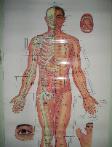
| Acupuncture has been practiced in China for several thousand years. According to ancient Chinese medical theory, the life force (called Qi and pronounced "chee") flows through the body via 14 invisible channels (called meridians), regulating all physical and mental processes. Opposing forces within the body, called yin and yang, must be balanced to keep Qi flowing properly. The meridians supposedly run deep within the body tissues and organs, surfacing at some 360 places identified as acupuncture points. The points all along such meridians even in the hands or feet are believed capable of affecting the associated internal organ. Stimulating these points can balance and restore the flow of Qi. Hair thin needles are inserted into acupuncture points along the meridians where energy imbalance has been diagnosed. This practice enhances the body natural healing by regulating the energy flow and restoring balance. This promotes better blood flow and encourages healing.. The patient is left to relax in a softly lit room for about twenty minutes. Patients often fall asleep. |
| Is Acupuncture painful? Patients are concerned about the comfort of acupuncture treatment. Unlike the injection needle that is thick, hollow and painful, an acupuncture needle is solid, extremely fine, and feels not much different from a mosquito bite. Is Acupuncture safe? Yes. Acupuncture needles are disposal, and used only one time. Acupuncture is a natural treatment. It is drug-free without side effects or dependency. What is Acupuncture? Acupuncture is a medical approach using needles to stimulate special points on the body to treat diseases. Acupuncture, as one of the most important parts of Chinese Medicine, is an effective system of examination, diagnosis and treatment for diseases and disorders. It seeks to destroy the disease roots, and alleviate symptoms by restoring natural balance of the human body. Acupuncture and Chinese Medicine have been practiced as a very effective medical method for thousand years. How does Acupuncture work? Chinese medical theory holds that vital life energy circulates through channels, called meridians, in human body. Channels are similar but not identical to the nervous and blood circulatory systems. Smooth and unobstructed energy circulation in Channels will keep body’s natural balance, resulting in good health. However, if the energy circulation is blocked in Channels for any reason, ailments and diseases occur. The function of acupuncture and Chinese medicine is to promote energy circulation smoothly, unblock Channel’s stagnation, restore natural balance in the body, and then cure the diseases. Are there any “do’s and don’ts” for me on the day of a treatment? Yes. To enhance the value of a treatment, the following guidelines are important: (1) Do not eat an unusually large meal immediately before or after your treatment. But please be sure to have had something before your treatment. (2) Do not over-exercise, engage in sexual activity, or consume alcoholic beverages within 6 hours before or after the treatment. (3) Plan your activities so that after the treatment you can get some rest, or at least not have to be working at top performance. Are there any side effects to the treatment? Usually not. As energy is redirected in the body, internal chemicals and hormones are stimulated and healing begins to take place. Occasionally the original symptoms worsen for a few days, or other general changes in appetite, sleep, bowel or urination patterns, or emotional state may be triggered. These should not cause concern, as they are simply indications that the acupuncture is starting to work. It is quite common with the first one or two treatments to have a sensation of deep relaxation or even mild disorientation immediately following the treatment. These pass within a short time, and never require anything more than a bit of rest to overcome. What kinds of diseases can be treated by acupuncture? Cardiovascular: Hypertension, Dizziness, Vertigo, Palpitation Children’s Diseases: Digestive problems, Bed wetting, Diarrhea, Constipation, Media Otitis, myopia Dermatology: Acne, Eczema, Canker sores, Boils, Varicose veins, Itching, shingles, Hives, face-lift Digestive: Gastric pain, Indigestion, Digestive ulcers, constipation, Irritable bowel syndrome, Abdominal pain, Diarrhea, Hiatal hernia, Gallbladder & Kidney infection and stones, Colitis, Hiccup (normal or after surgery), Hemorrhoids Emotional: Anxiety, Depression, Insomnia, Nervousness, Neurosis stress Eye-Ear-Nose-Throat: Macular degeneration, Retina detachments, Retinitis Pigmentosa, Diabetic Retinopathy, Tinnitus, Teeth ache, Double vision, Conjunctivitis Gynecological: Infertility, Menopause, hotflash, PMS, Cystitis, Ovarian Cysts, Irregular Menstruation, Habitual Miscarriage, Endometriosis Men’s Diseases: Prostatitis Musculoskeletal: Neck pain, Back pain, Whiplash, Sciatica, Tightness, Weakness, Arthritis, Frozen Shoulder, Auto-injury, Sports injury, Tennis elbow, Carpal tunnel syndrome, fibromyalgia Neurological: headache, Migraine, Stroke, Bell’s palsy, Parkinson’s disease, Trigeminal neuralgia, Sciatica, Epilepsy Respiratory: Sinusitis, Asthma, Cough, Chronic bronchitis, Emphysema, Tonsillitis Other Treatments: Weight gain/loss, Allergies, Hay Fever, Thyroid Condition, Athletic performance, Chronic fatigue, Immune system tonification, Incontinence of urine, UTI, Edema, Diabetes, Lupus, Cancer pain Addictions: Alcohol, Tobacco, Barbiturates, and Heroin. |
ACUPUNCTURE & HERBAL MEDICINE
BY Dr.HUI SI(HELEN ZHOU)
BY Dr.HUI SI(HELEN ZHOU)


